News Blog
Latest News From Our Volunteers in Nepal
VOLUNTEER COMMUNITY CARE CLINICS IN NEPAL
Nepal remains one of the poorest countries in the world and has been plagued with political unrest and military conflict for the past decade. In 2015, a pair of major earthquakes devastated this small and fragile country.
Since 2008, the Acupuncture Relief Project has provided over 300,000 treatments to patients living in rural villages outside of Kathmandu Nepal. Our efforts include the treatment of patients living without access to modern medical care as well as people suffering from extreme poverty, substance abuse and social disfranchisement.
Common conditions include musculoskeletal pain, digestive pain, hypertension, diabetes, stroke rehabilitation, uterine prolapse, asthma, and recovery from tuberculosis treatment, typhoid fever, and surgery.
FEATURED CASE STUDIES
Rheumatoid Arthritis +

35-year-old female presents with multiple bilateral joint pain beginning 18 months previously and had received a diagnosis of…
Autism Spectrum Disorder +

20-year-old male patient presents with decreased mental capacity, which his mother states has been present since birth. He…
Spinal Trauma Sequelae with Osteoarthritis of Right Knee +
60-year-old female presents with spinal trauma sequela consisting of constant mid- to high grade pain and restricted flexion…
Chronic Vomiting +

80-year-old male presents with vomiting 20 minutes after each meal for 2 years. At the time of initial…
COMPASSION CONNECT : DOCUMENTARY SERIES

Episode 1
Rural Primary Care
In the aftermath of the 2015 Gorkha Earthquake, this episode explores the challenges of providing basic medical access for people living in rural areas.

Episode 2
Integrated Medicine
Acupuncture Relief Project tackles complicated medical cases through accurate assessment and the cooperation of both governmental and non-governmental agencies.

Episode 3
Working With The Government
Cooperation with the local government yields a unique opportunities to establish a new integrated medicine outpost in Bajra Barahi, Makawanpur, Nepal.

Episode 4
Case Management
Complicated medical cases require extraordinary effort. This episode follows 4-year-old Sushmita in her battle with tuberculosis.

Episode 5
Sober Recovery
Drug and alcohol abuse is a constant issue in both rural and urban areas of Nepal. Local customs and few treatment facilities prove difficult obstacles.

Episode 6
The Interpreters
Interpreters help make a critical connection between patients and practitioners. This episode explores the people that make our medicine possible and what it takes to do the job.

Episode 7
Future Doctors of Nepal
This episode looks at the people and the process of creating a new generation of Nepali rural health providers.

Compassion Connects
2012 Pilot Episode
In this 2011, documentary, Film-maker Tristan Stoch successfully illustrates many of the complexities of providing primary medical care in a third world environment.
From Our Blog
- Details
- By Andrew Schlabach
As a person that can't quite get enough of Nepal I sometimes find it hard to convey to my friends, patients and colleagues just what keeps me going back. It is a place so filled with contradiction and wonder that it just gets into your blood. Recently I read the latest book by Jeff Greenwald called Snake Lake. Jeff writes that when he first visited the Hindu kingdom in 1979 he knew that he had arrived "home". I think the Jeff and I were probably meant to be neighbors because Kathmandu also feels like home to me. Even with all its pollution, constant political upheaval and abundant poverty, Nepal never ceases to captivate my sense of brotherhood in the world.
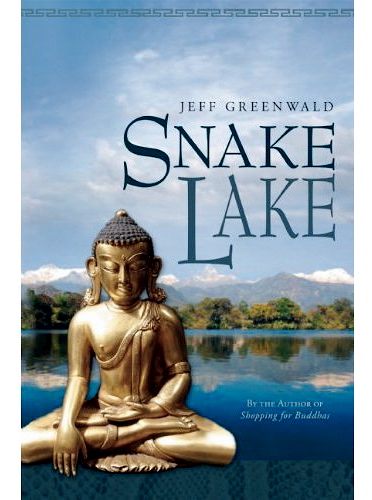 Snake Lake is an amazing first hand account of Nepal's political drama and corruption. More than that, it is a humorous memoir with a delightful introspective look at why this exotic place is so beautifully captivating. I know it is a place that always calling for me to "come home."
Snake Lake is an amazing first hand account of Nepal's political drama and corruption. More than that, it is a humorous memoir with a delightful introspective look at why this exotic place is so beautifully captivating. I know it is a place that always calling for me to "come home."
I contacted Jeff and he gave me permission to share this short article on our blog. I hope you enjoy it. - Andrew
Admin note: Thanks to Jeff Greenwald for this contribution. You can find his book Snake Lake at Amazon.com
The Facts of Kathmandu
© 2011 by Jeff Greenwald
I first arrived in Nepal as a tourist, in July of 1979. The giddy entry in my journal that day reads, “Welcome home.” Without understanding why, I’d found the place that would be my spiritual refuge and writer’s retreat for the next 30 years.
I stayed in Nepal for five months that year, and returned in 1983 on a year-long journalism fellowship. I’ve come back nearly every year since. Shopping for Buddhas, written in 1988, focused on my search for the “perfect” Buddha statue—but that theme served as a foil for exploring Nepal’s awkward entry in the modern age. My new book, Snake Lake, is set in Kathmandu in the Spring of 1990, during the often violent pro-democracy uprising. The revolution tipped the late King Birendra off his divine throne, and into a constitutional monarchy. That was when Nepal’s real struggle began.
The changes I’ve seen during the past 20 years have touched every facet of life in the country. From the Royal Massacre to the tragic civil war; from the runaway development of the Valley to the emergence of China as an eager and bossy ally. Kathmandu is no longer the place of innocence it seemed to be in the 1980s, when I shopped for Buddha statues in uncrowded chowks, or strolled down narrow lanes as sacred cows eyed me warily from doorways. When the monarchy was abolished in 2008, and a Maoist government took over, even the country’s exotic tag line—“The World’s Only Hindu Kingdom”—became obsolete.
- Details
- By Diane Wintzer
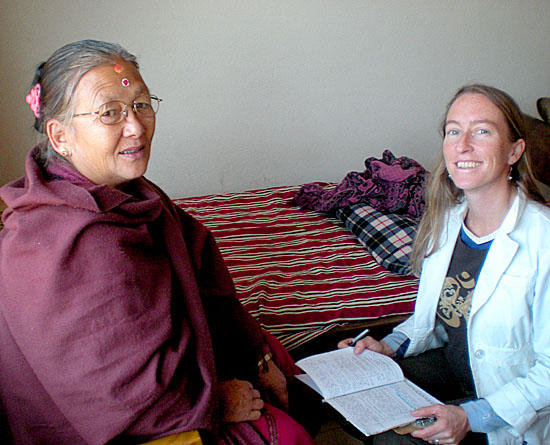
{s5_mp3}http://www.acupuncturereliefproject.org/images/stories/mp3/OMV2.mp3{/s5_mp3}One Minute View: Episode 2
These first few weeks have gone fast! It's amazing how quickly all the newness of such an experience is transformed into a mostly reliable routine. That routine serves as a safety net for all the unknowns in a day. A common theme that has come up for us is the idea of "what gets lost in translation anyway?". This idea is multi-dimensional and in it is reflected a person's story, a person's belief system, how a person understands something, and how well our language conveys across culture the story we are telling. Our interpreters are trained very well for their jobs - they are excellent! They make the exchange almost seamless! They not only interpret what we say and what our patients say, but they also have to interpret the context and the emotion of what is said.
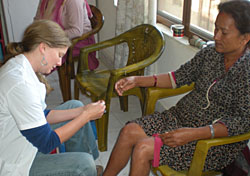 It's
similar to a game of telephone but rather than the story being changed
through a long line of people, it is more a matter of how our stories
get filtered through our different ways of experiencing the world.
Despite our mostly clear communication, we realize that some concepts
don't exist in one culture exactly the same as it does in another. I
recently learned that there really is not a word in Nepali for
"throbbing", as in a throbbing headache, but rather the interpreter
explains that the patient says, "the headache feels like it does when
you have your finger on someone's pulse." It's a beautiful moment when
it comes together like that!
It's
similar to a game of telephone but rather than the story being changed
through a long line of people, it is more a matter of how our stories
get filtered through our different ways of experiencing the world.
Despite our mostly clear communication, we realize that some concepts
don't exist in one culture exactly the same as it does in another. I
recently learned that there really is not a word in Nepali for
"throbbing", as in a throbbing headache, but rather the interpreter
explains that the patient says, "the headache feels like it does when
you have your finger on someone's pulse." It's a beautiful moment when
it comes together like that!
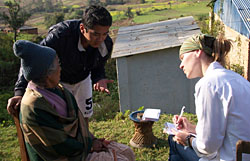 I sit back at the end of a day of
treating patients and observing the other practitioners treating, and
settle on this idea: what gets lost in translation is made up for by
watching someone's facial expression, by observing a persons hands when
they talk, by watching their chest rise and fall to understand their
breathing, by noticing how someone gets in or out of their chair, by
paying attention to the tone of their voice behind the story, by
palpating the spots that hurt, and by looking in their eyes clearly for
the moment when the ritualistic "namaste" is exchanged in their coming
and going. Sometimes the story matches what we expect to hear - "I have
diabetes, I have knee pain, or I have burning and tingling in my feet"
I sit back at the end of a day of
treating patients and observing the other practitioners treating, and
settle on this idea: what gets lost in translation is made up for by
watching someone's facial expression, by observing a persons hands when
they talk, by watching their chest rise and fall to understand their
breathing, by noticing how someone gets in or out of their chair, by
paying attention to the tone of their voice behind the story, by
palpating the spots that hurt, and by looking in their eyes clearly for
the moment when the ritualistic "namaste" is exchanged in their coming
and going. Sometimes the story matches what we expect to hear - "I have
diabetes, I have knee pain, or I have burning and tingling in my feet"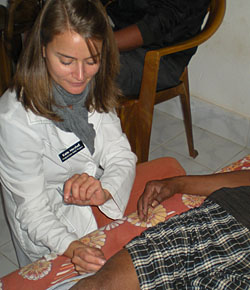 and other times
the story makes us see something differently as a person shares that
they believe they might have a curse on them, or they had an organ
removed and then put back in the right place, or sometimes a nerve grows
out of the corner of their toe and when it does it hurts and they cut
it off. As a practitioner, sometimes I rely on the story I'm hearing
while other times I may follow a feeling or intuition of the experience
that seems to resonate in their story. In the case of the mystery toe
pain... Maybe they're telling me they have an ingrown toenail that feels
incredibly nervy and painful or maybe they are experiencing something
that is completely lost in translation. As I work though the many puzzles
and mysteries I come to this essential realization. The realization
that if we learn to listen carefully and do our best to hear not only
the story they share but also the story they embody, the treatment we
offer can speak better to the overall CARE of that individual patient.
The more we improve in this skill, the more we minimize all that gets
lost along the way. The story that each of us shares, through the bridge
of an interpreter or through the descriptive sounds and the hand
gestures, are the stories that link us together. It is the sharing of
our stories that creates deeper understanding and compassion between us
and opens our eyes to much more than what simple words can convey. – Diane Wintzer
and other times
the story makes us see something differently as a person shares that
they believe they might have a curse on them, or they had an organ
removed and then put back in the right place, or sometimes a nerve grows
out of the corner of their toe and when it does it hurts and they cut
it off. As a practitioner, sometimes I rely on the story I'm hearing
while other times I may follow a feeling or intuition of the experience
that seems to resonate in their story. In the case of the mystery toe
pain... Maybe they're telling me they have an ingrown toenail that feels
incredibly nervy and painful or maybe they are experiencing something
that is completely lost in translation. As I work though the many puzzles
and mysteries I come to this essential realization. The realization
that if we learn to listen carefully and do our best to hear not only
the story they share but also the story they embody, the treatment we
offer can speak better to the overall CARE of that individual patient.
The more we improve in this skill, the more we minimize all that gets
lost along the way. The story that each of us shares, through the bridge
of an interpreter or through the descriptive sounds and the hand
gestures, are the stories that link us together. It is the sharing of
our stories that creates deeper understanding and compassion between us
and opens our eyes to much more than what simple words can convey. – Diane Wintzer
Admin note: This was Diane Wintzer's second trip to Nepal with the Acupuncture Relief Project. This fall she served as our project lead and course instructor. When she is not in Nepal, Diane practices at Fearn Natural Health Clinic in Camas Washington. Thanks Diane for your continued service.
- Details
- By Leith Nippes
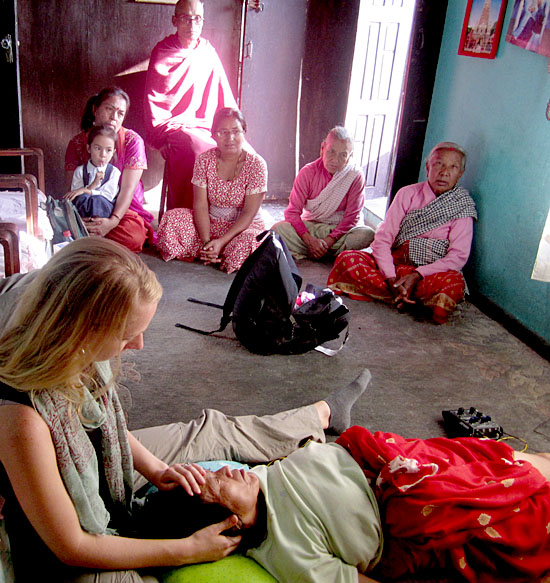
This would be my 6th trip to Nepal, but my first time experiencing it during monsoon. The valley was bone dry when I last left and after 7.5 months without rain everything was covered in a heavy layer of dust. Today, the valley is a sea of green and mud from months of monsoon. When it rains, it’s as though a wall of water is falling for hours at a time. But the air is clean, the temperature and humidity much more manageable than the 90+ degrees in Kathmandu with humidity trapping in the pollution.
It feels like a homecoming for me, I am very excited to see my “Nepal family”; ARP staff, friends, Monks, patients, and even the dogs. I am greeted by big smiles, prayer hands, blessings, wagging tails, chai tea, and an excited monk running into me around a corner when he hears of my arrival.
I look out the window and I see my “favorite stroke patient”, Mr. Thapa. He is the 43 year old Nepali police officer who suffered a severe stroke over 10 years ago. We have reported on his case and development over the last 3 years. Today he is 30 minutes early and waiting for the clinic to open, squatting on his heels in the alley. This is a new range of motion I have not seen from him before. He is excited to show me a lot of other new ranges of motion he has gained through his acupuncture treatments. He puts both his right arm and leg through almost noodle -like dance motions, he is thrilled with the treatments, the level of care, and his improvement. At this point he comes to work on his speech and excess saliva. Anne Frances will work with him 3 times a week for the next month focusing mainly on scalp acupuncture. 2 weeks later his speech is clear, the saliva level is no longer an issue and suddenly he is speaking English! He has always used some English words and fragmented sentences but he is now conversational. It’s hard for everyone in the room to contain their joy, excitement and laughter. Before the stroke, Mr. Thapa spoke multiple languages (Nepali, Nawari, Hindi, and English). Immediately after the stroke it was only Hindi which remained, interestingly not his first language. So the question that now comes to mind; does he now feel confident enough with the decreased saliva level to speak more English? Or did the scalp treatment awaken a part of his brain that has been asleep for years?
One day after Mr. Thapa's speech improvement, I saw an article published in the Kathmandu Times that reported a study in Korea and Germany has found that Acupuncture is not effective in helping with post stroke rehabilitation. I literally laughed out loud.
ARP and the Vajra Varahi Clinic continue to be a welcome part of the Chapagaon community. We treat multiple patients from the same and extended families as word spreads of the level of care and the results from acupuncture and herbs. Some patients still hike multiple hours each way, out of the hills for treatment. This year I met a family who had rented a room in the village so the husband could receive treatment for his stroke multiple times a week. We also had an opportunity to perform a house call on an older woman who had just experienced a stroke only 6 days earlier. This is a rare opportunity for ARP as most of our stroke patients suffered from their episode years earlier. Treating the patient on the floor, both Anne Frances and I began to work. When we finally looked up from our patient we were surrounded by her friends and family of all generations, a monk, and our taxi driver all whom were sitting cross legged and praying for her. It was an amazing lesson in the power of group healing and prayer.

Years ago I had the privilege of studying under an acupuncturist who referred to all his patients as his teacher. Each patient gave him the unique opportunity to learn something new about not only the individual in his office, but also the medicine and himself all from the perspective of his patient/ teacher. I have tried to keep this in mind during both my travels and treatments. My greatest teacher on this trip has been a 68yr old man with Parkinson’s. He has taken all the pharmaceuticals for his condition and after years the medication is no longer effective. His shaking is uncontrollable, but he has learned that by keeping beetle nut in his mouth his speech is not a problem. He looked at me one day during treatment and asked if this condition was something that he had caught from someone and was worried that he might pass it along. He said that people avoid him on the bus and out in the village, some fearful that he has been bitten by a demon, causing his shaking. It was eye-opening to me; I see a man with Parkinson’s but to most in Nepal this condition is a mystery that holds quite a stigma as a result of lack of understanding. Even with all the difficulties that Parkinson has presented to his life, his real fear was about passing it along to a stranger. I am very grateful for the new perspective my teacher has given to me.
I would like to thank all those who have and continue to help support our project. It is a blessing to be of service to the wonderful people of Nepal.
– Namaste, Leith Nippes
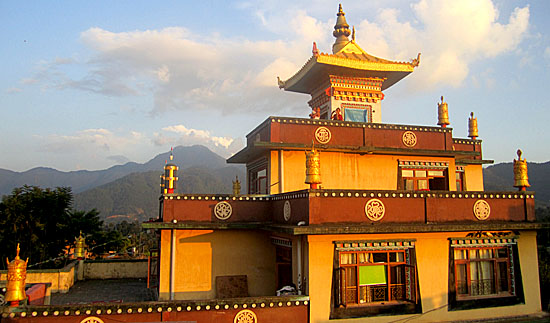
Admin note: Leith Nippes is a co-founder of the Acupuncture Relief Project and serves on the Board of Directors. Without Leith's endless energy, enthusiasm and dedication to inspiring our community of acupuncture practitioners all over the world... this project would not be possible.
Our Mission
Acupuncture Relief Project, Inc. is a volunteer-based, 501(c)3 non-profit organization (Tax ID: 26-3335265). Our mission is to provide free medical support to those affected by poverty, conflict or disaster while offering an educationally meaningful experience to influence the professional development and personal growth of compassionate medical practitioners.
